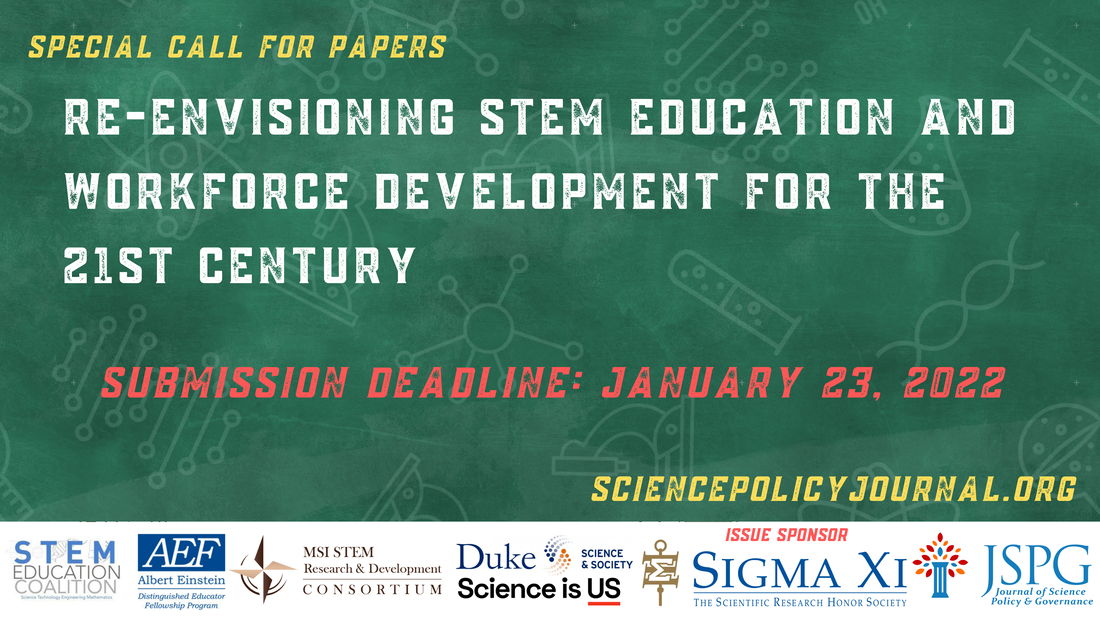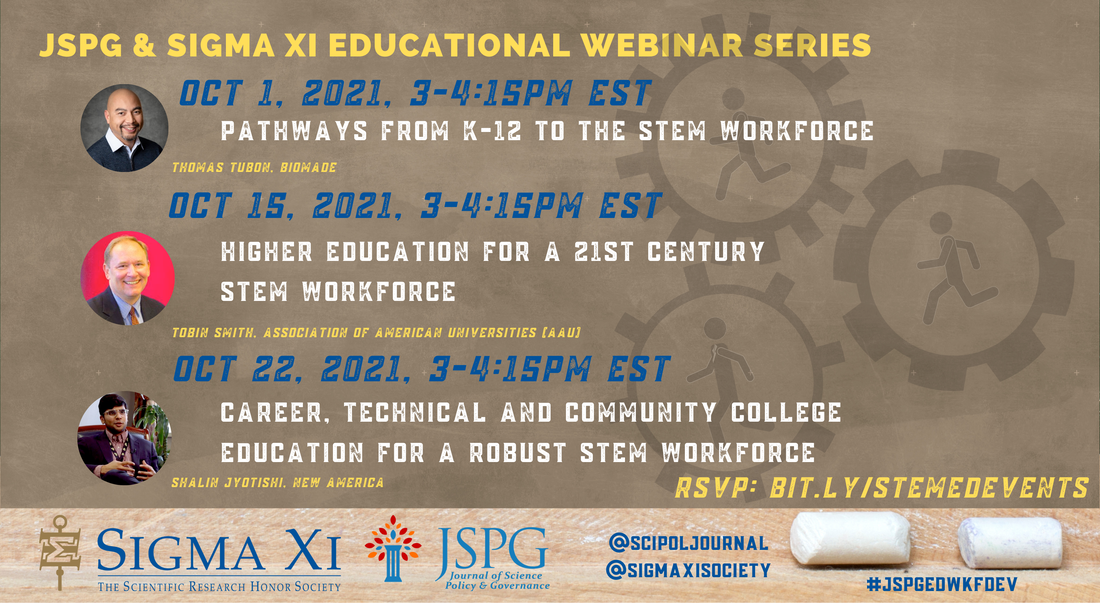Special Topics Call for Submissions — Re-envisioning STEM Education and Workforce
Development for the 21st Century
The deadline has passed.
The COVID-19 pandemic has exposed and exacerbated educational inadequacies and inequities for students pursuing STEM careers. This partnership with JSPG will harness the knowledge and experience of emerging leaders to help build more equitable and effective education and training programs.
— Jamie Vernon, Executive Director and CEO of Sigma Xi & Publisher of American Scientist
As we consider the fundamentally different landscape of STEM education and workforce development resulting from the COVID-19 pandemic, we are thrilled to launch this call for papers and competition with Sigma Xi to engage the next generation in re-envisioning the future of the field.
— Adriana Bankston, CEO & Managing Publisher of the Journal of Science Policy & Governance
SPECIAL CALL FOR SUBMISSIONS:
The Journal of Science Policy & Governance (JSPG) and Sigma Xi, The Scientific Research Honor Society are pleased to announce a call for papers and competition on Re-envisioning STEM Education and Workforce Development for the 21st Century.
We invite students, post-docs, policy fellows, and early career professionals worldwide to submit op-eds and policy position papers to re-envision the landscape of STEM education and workforce development in the light of the COVID-19 pandemic, and to build forward a future that is focused on equity and inclusion, access to technology, and aligning training opportunities with workforce demands. Submission deadline: January 23, 2022. First, second, and third place competition winners will be awarded cash prizes.
This issue is also supported in-kind by outreach partners from STEM Education Coalition, Albert Einstein Distinguished Educator Fellowship Program, MSI STEM Research & Development Consortium, Duke Science & Society and Science is US.
Follow JSPG on Twitter, Facebook, LinkedIn, Instagram, and YouTube. Join our monthly newsletter. Tweet using #JSPGEDWKFDEV.
We invite students, post-docs, policy fellows, and early career professionals worldwide to submit op-eds and policy position papers to re-envision the landscape of STEM education and workforce development in the light of the COVID-19 pandemic, and to build forward a future that is focused on equity and inclusion, access to technology, and aligning training opportunities with workforce demands. Submission deadline: January 23, 2022. First, second, and third place competition winners will be awarded cash prizes.
This issue is also supported in-kind by outreach partners from STEM Education Coalition, Albert Einstein Distinguished Educator Fellowship Program, MSI STEM Research & Development Consortium, Duke Science & Society and Science is US.
Follow JSPG on Twitter, Facebook, LinkedIn, Instagram, and YouTube. Join our monthly newsletter. Tweet using #JSPGEDWKFDEV.
Three Best Papers Competition:
In addition to the publication opportunities, an external review committee will select the top three publications which will receive cash prizes:
Prize winning authors will be invited to present their paper during Sigma Xi’s annual conference. These authors will also be invited to submit an adapted manuscript to Sigma Xi’s award-winning publication, American Scientist. Acceptance would be dependent on following the magazine’s editorial guidelines and process and would include an additional $500 honorarium upon publication.
The criteria by which competition prize winners will be chosen can be found in this rubric.
All published authors will be supported through strategic communications and interviewed for episodes of JSPG's podcast SciPol SoundBites and will be invited to participate in outreach events and opportunities organized by JSPG and Sigma Xi once the issue is released.
- First Prize: $1,000 USD
- Second prize: $750 USD
- Third prize: $500 USD
Prize winning authors will be invited to present their paper during Sigma Xi’s annual conference. These authors will also be invited to submit an adapted manuscript to Sigma Xi’s award-winning publication, American Scientist. Acceptance would be dependent on following the magazine’s editorial guidelines and process and would include an additional $500 honorarium upon publication.
The criteria by which competition prize winners will be chosen can be found in this rubric.
All published authors will be supported through strategic communications and interviewed for episodes of JSPG's podcast SciPol SoundBites and will be invited to participate in outreach events and opportunities organized by JSPG and Sigma Xi once the issue is released.
Guiding Events:
To facilitate high-level discussions on these topics leading up to the submission deadline, experts in STEM education and workforce development from Advancing Research Impact in Society (ARIS), New America, and the Association of American Universities (AAU) will organize and moderate an educational webinar series. In addition, JSPG and Sigma Xi will organize a writing workshop for op-eds and policy position papers to help prospective authors improve their submissions to the issue.
Please register for the webinars and writing workshop below. More information on these events will be shared as it becomes available. Questions regarding these events may be directed to JSPG's Director of U.S. Outreach Nicole Parker.
Please register for the webinars and writing workshop below. More information on these events will be shared as it becomes available. Questions regarding these events may be directed to JSPG's Director of U.S. Outreach Nicole Parker.
Webinar 1: October 1, 2021: Pathways from K-12 to the STEM workforce - moderator: Susan Renoe from Advancing Research Impact in Society (ARIS)
Webinar 2: October 15, 2021: Higher education for a 21st Century STEM workforce - moderator: Tobin Smith from Association of American Universities (AAU)
Webinar 3: October 22, 2021: Career, technical and community college education for a robust STEM workforce - moderator: Shalin Jyotishi from New America
Writing workshop: November 6 & 7, 2021: STEM education and workforce development policy writing workshop - moderated by Nicole Parker from JSPG. The workshop will take place during the Sigma Xi annual conference and is open to the public. More information about the writing workshop coming soon.
Webinar 2: October 15, 2021: Higher education for a 21st Century STEM workforce - moderator: Tobin Smith from Association of American Universities (AAU)
Webinar 3: October 22, 2021: Career, technical and community college education for a robust STEM workforce - moderator: Shalin Jyotishi from New America
Writing workshop: November 6 & 7, 2021: STEM education and workforce development policy writing workshop - moderated by Nicole Parker from JSPG. The workshop will take place during the Sigma Xi annual conference and is open to the public. More information about the writing workshop coming soon.
Background and Submission Guidelines:
The COVID-19 pandemic has impacted future generations in terms of educational opportunities, learning formats, and STEM workforce structure. The educational system quickly adapted to the virtual environment, requiring both students and teachers to have almost immediate access to technology. This shift has created both opportunities and inequities in STEM education due to the necessity of access to technology. At the same time, the STEM workforce has changed dramatically within a very short period, because of increased digitization and automation of the labor market, requiring workers in STEM fields to acquire technological expertise for conducting basic research and developing future innovations.
This new landscape will require novel, flexible entry points and pathways to recruit, develop, and retain the STEM workforce of the 21st century. These entry points and pathways include:
Authors will be invited to develop bold, innovative, timely, and equitable policies for re-envisioning STEM education and workforce development policy in this new landscape, in the light of societal changes accelerated by the COVID-19 pandemic, such as advances in technology, public tolerance for new work and educational models, and demographic shifts.
Article formats:
This new landscape will require novel, flexible entry points and pathways to recruit, develop, and retain the STEM workforce of the 21st century. These entry points and pathways include:
- Supporting K-12 students to enter higher education as a stepping-stone into the STEM workforce
- Creating pathways for K-12 students to enter the STEM workforce by providing experiential learning opportunities
- Enhancing career and technical education for students in community colleges and supporting their upskilling to enter the STEM workforce
- Building equitable and inclusive environments for students of all backgrounds to enter and excel within the STEM workforce
- Broadening the skill sets provided at all levels to prepare students for the new work environment
- Developing opportunities and mechanisms for undergraduate and graduate students to enter the STEM workforce following their higher education training
Authors will be invited to develop bold, innovative, timely, and equitable policies for re-envisioning STEM education and workforce development policy in this new landscape, in the light of societal changes accelerated by the COVID-19 pandemic, such as advances in technology, public tolerance for new work and educational models, and demographic shifts.
Article formats:
- Op-eds are used to describe a piece of writing that expresses a personal opinion and is usually printed in a newspaper opposite the page on which the editorial is printed. Op-eds must be 2000 words in length or less, and include policy or governance implications. Visit this link for an example of an op-ed.
- Policy position papers provide a decision maker with an overview of an issue or problem, targeted analysis, and actionable recommendations. Policy position papers must be 30 pages or less, include an executive summary, and include policy recommendations. Visit this link for an example of a policy position paper.
Guiding Questions:
Desired policy change in STEM education and workforce development will require a thorough analysis of how the current system operates, adaptations that will need to occur during and after the COVID-19 pandemic, and long-lasting changes leading to improved preparation for future pandemics. Guiding questions include:
- What are the policies currently constraining STEM education and training across the globe? How can we increase access to education through more equitable policy development?
- How has the COVID-19 pandemic exposed and exacerbated educational inadequacies and inequities for students in STEM disciplines, and how do we counter these impacts?
- What kinds of policies would best support students in STEM disciplines in their preparation for the future workforce and a changing job market brought on by the pandemic?
- What are potential pathways into the STEM workforce and what kinds of policies would be required for these to be successfully expanded?
- How has our system of STEM education and workforce development adapted to the current pandemic? What are some lessons learned and policy improvements needed to better adapt to future pandemics?
- What should future policymaking look like to achieve positive societal change based on STEM education and workforce development? How might these ideas be implemented?
- What are some calls to action for state and federal governments, educational institutions, funding agencies, and public and private sector entities for these changes to occur?
Recommended readings:
- Blank, Rebecca. For a Competitive Economy, We Need a Skilled Workforce. Issues in Science and Technology. (2021)
- National Academies of Sciences, Engineering, and Medicine. 2021. Call to Action for Science Education: Building Opportunity for the Future. Washington, DC: The National Academies Press.https://doi.org/10.17226/26152.
- McKinsey & Company. Building workforce skills at scale to thrive during-and after-the COVID-19 crisis. (2021)
- Manpower Group. Skills Revolution Reboot: The 3Rs- Renew, Reskill, Redeploy. (2021)
- Federal Reserve System. Understanding the disconnect between economic development and workforce development systems. (2019)
- National Science Foundation (Alison Gillespie). What do the data say about the current state of K-12 STEM education in the US?. (2021)
- New America (Alejandra Acosta, Elin Johnson, Iris Palmer and Wesley Whistle). Federal Higher Education Policy During COVID-19. (2021)



